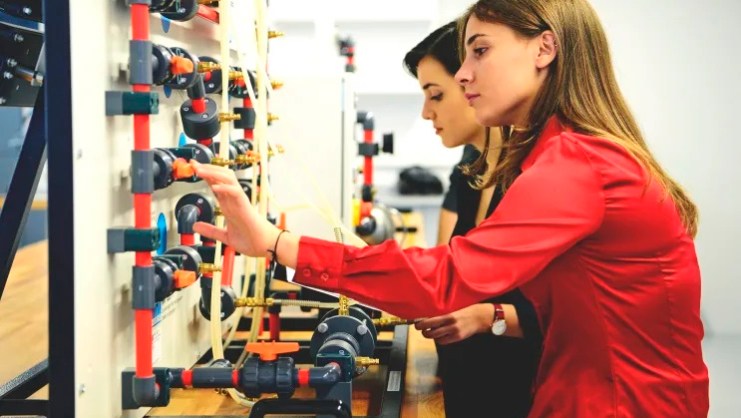University logo:
Program name: Civil Engineering
University name: Ilia State university
Faculty: School of Business, Technology and Education
Web-page: https://iliauni.edu.ge/
University address: Cholokashvili Ave 3/5, Tbilisi 0162, Georgia
Representative email: enroll@orientcities.com
Civil Engineering Program Overview
The Bachelor of Civil Engineering program was developed in 2019 based on the analogy of the world-renowned accredited program (Accreditation Program (ABET- Council for Engineering and Technology Accreditation) of San Diego State University (SDSU), Civil Engineering. The program aims to train highly qualified specialists in the field of engineering and focuses on areas of civil engineering such as water resources engineering, structural and geotechnical engineering, and transport engineering.
The mission of Civil Engineering at Ilia State University is to prepare our students for careers in their chosen area of specialization. As such, the program aims to provide quality instruction, advisory services, and student support to ensure students achieve their goals and gain the knowledge and experience required to succeed in the demanding field of civil engineering
The Program Educational Objectives of the Civil Engineering program are closely aligned with Ilia University’s mission of advancing science to the benefit of society locally and internationally.
Program Objectives
This program focuses on the delivery of interdisciplinary courses to create well-rounded holistic thinkers, problem solvers, and future leaders in the civil engineering fields of water, transport, structural and geotechnical engineering. To complement the interdisciplinary learning promoted by this program, students will have the ability to take business administration courses to acquire managerial skills that are instrumental to a successful professional career.
Within the program, fundamental courses in maths, physics, chemistry, and additional natural science electives build to later courses in engineering design. The program is structured to ensure adequate incremental practical and theoretical knowledge in the field of Civil Engineering. Program graduates will be competitive professionals in Georgia or abroad in areas of project and engineering design and management. They will also be able to continue their education at the master’s level of studies.
Main areas of study
- Maths, Physics and Chemistry Foundation Courses:
60 ECTS of Foundation Maths, Physics and Chemistry with associated laboratories ensures a good base for continued advanced learning for our civil engineering students.
General Education:
General Education includes courses (56 ECTS) in line with the philosophical direction of Ilia State University
including “Construction and Culture” specifically tailored for engineers and the following language courses
Practical Course of Georgian for Foreigners / Practical Course of German/English – 12 ECTS
* International students must pass both Practical Courses of Georgian; local students must pass Practical Courses of German or English language.
Major Program:
- Mandatory courses of Civil Engineering Bachelor program – 108 ECTS (including 8 design ECTS)
- Mandatory/elective courses Civil Engineering Bachelor Program – 24 ECTS
- Internship – 4 ECTS
Mandatory/elective course choices: Students choose four courses from the following six areas (no more than 1 in each area – this ensures a broad knowledge base that can be further specified in graduate studies).
Water and Environmental – Civil Engineering (Applied Hydrology).
Transportation – Civil Engineering (Traffic Engineering, Highway Engineering).
Structural – Civil Engineering (Structural Engineering – 2 options).
Geotechnical – Civil Engineering (GeotechnicalEngineering).
Learning Outcomes and Competencies
- An ability to identify, formulate, and solve complex engineering problems by applying principles of engineering, science, and mathematics
- An ability to apply engineering design to produce solutions that meet specified needs with consideration of public health, safety, and welfare, as well as global, cultural, social, environmental, and economic factors
- An ability to communicate effectively with a range of audiences
- An ability to recognize ethical and professional responsibilities in engineering situations and make informed judgments, which must consider the impact of engineering solutions in global, economic, environmental, and societal contexts
- An ability to function effectively on a team whose members together provide leadership, create a collaborative and inclusive environment, establish goals, plan tasks, and meet objectives
- An ability to develop and conduct appropriate experimentation, analyze and interpret data, and use engineering judgment to draw conclusions
An ability to acquire and apply new knowledge as needed, using appropriate learning strategies.
Teaching Methods
- Lectures and Seminars/Written and verbal method;
- Laboratory Work;
- Practical Work;
- Project Work Individually and in Teams.
Note: Specific teaching methods are identified for each individual program component and are listed in relevant syllabi.
Employment Opportunities
Graduated students can be employed in a variety of organizations related to planning, design, construction, management, maintenance, repair, and renewal of infrastructure components such as building, transportation, energy, and water systems. The employment scope can include:
- Construction management and engineering design of houses and industrial buildings;
- Transportation construction and asset management of roads and railways with associated tunnels and bridges, Traffic analysis and transportation planning;
- Water supply, sewerage, wastewater treatment, and reservoirs design and construction;
- Inspection and assessment of existing buildings and strengthening of them;
- Public Enterprises such as Municipalities, and government-owned infrastructure companies;
- Diagnostics and repair of a wide range of engineering equipment (household, medical, military, etc.);
Renewable energy systems design and construction management.
Civil Engineering Program Structure
The bachelor’s program in civil engeneering is a 4-year program (8 semesters). To fulfill the requirements of the program, student needs to accumulate 252 ECTS, including:
- Maths, Physics, and Chemistry – 60 ECTS
- General Education – 56 ECTS (including 24 ECTS of electives from business administration and natural sciences; minimum of 6 ECTS natural science and 6 ECTS business administration)
- Major program – 136 ECTS (including 24 ECTS of electives)
| AVAILABLE SPECIALIZATION | THE DEGREE AWARDED | AMOUNT OF ALLOCATED ECTS | DURATION OF STUDY | THE LANGUAGE OF STUDY | ANNUAL INSTALLMENT |
|---|---|---|---|---|---|
| Civil Engineering | Bachelor of Civil Engineering | 252 ECTS | 4 years, 8 semesters | English | $ 3 500 USD |
Additional Resources
Register Now!!! and Begin Your Journey Towards Becoming a Certified Civil Engineer!
Representative email: enroll@orientcities.com
The documents required to obtain admission:
- Copy of the passport;
- School certificate (Equivalent to A level for Undergraduate Applicants / BA degree Diploma (for MA degree applicants) along with transcript;
- Application fee payment receipt.
- Video Interview (Ask us for details of this interview)
- The student’s E-mail address and contact details






